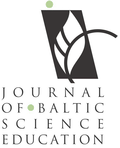THE IMPACT OF A SCIENCE METHODS COURSE ON FEMALE PRE-SERVICE TEACHERS’ BELIEFS WITHIN A SAUDI-ARABIAN CONTEXT
| Title | THE IMPACT OF A SCIENCE METHODS COURSE ON FEMALE PRE-SERVICE TEACHERS’ BELIEFS WITHIN A SAUDI-ARABIAN CONTEXT |
| Publication Type | Journal Article |
| Year of Publication | 2019 |
| Authors | Alghamdi, A. K. H., Kim, SY |
| Journal | Journal of Baltic Science Education |
| Volume | 18 |
| Issue | 1 |
| Start Page | 19-38 |
| Pagination | Continuous |
| Date Published | February/2019 |
| Type of Article | Original article |
| ISSN | 1648-3898 |
| Other Numbers | E-ISSN 2538-7138 |
| Keywords | pre-service teachers, science teachers’ beliefs, self-efficacy, teachers in Saudi Arabia, teaching strategy |
| Abstract | This research examines the impact of a science methods course on the beliefs of female pre-service teachers (PSTs) in Saudi Arabia. Forty-seven female PSTs enrolled in a diploma of education programme at Imam Abdulrahman Bin Faisal University (IAU) took a 16-week science methods course aimed at promoting their beliefs about their own self-efficacy, science teaching strategies, and science content knowledge (SCK). The PSTs completed a 30-item questionnaire on science teaching beliefs (five- point Likert Scale) both before and after taking the course. Data analysis revealed that the PSTs’ beliefs regarding their own self-efficacy changed after the course (statistically significant t=2.792, p 0.01) with scores indicating increased beliefs. Although increases were also observed for beliefs regarding science teaching methods and strategies and science content knowledge, they were very slight and not statistically significant. Overall, mean scores fell within the ‘neither agree nor disagree’ category for all three themes, ranging from 2.98 to 3.24. As one of the first studies in Saudi Arabia on PSTs’ science teaching beliefs, this research filled a gap in the existing literature. Grounded in the moderate scores for all three themes, recommendations for future science education course design are tendered as are suggestions for future research. |
| URL | http://oaji.net/articles/2019/987-1550082669.pdf |
| DOI | 10.33225/jbse/19.18.19 |
| Refereed Designation | Refereed |
| Full Text |
